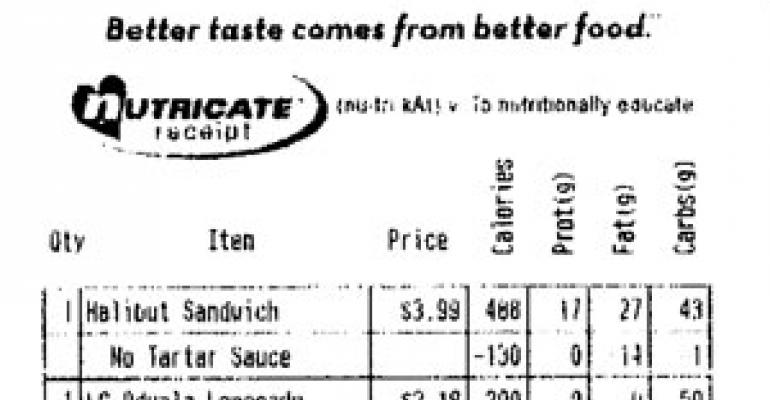PORTLAND Ore. Burgerville said Monday it is testing at a unit here technology that calculates the nutritional metrics of individual orders, customized or standard, and prints them on receipts.
“Guest reaction to our pilot program has been very favorable,” said Debe Nagy-Nero, a registered dietician and director of quality assurance, nutrition and safety for the 39-unit quick-service chain, which is based in Vancouver, Wash.
She noted that the test at the Martin Luther King Boulevard Burgerville unit in downtown Portland has been under way since the first week of June and involves the technology of Nutricate Corp. of Santa Barbara, Calif.
In addition to breaking down the fat content, calories, carbohydrates and protein in each item, the technology being used by Burgerville also prints on receipts suggestions for lowering fat or calories on future visits. Along those lines, a receipt might include a suggestion for ordering the same sandwich without cheese or minus a condiment. The technology also has the ability to include on receipts coupons or virtually any other message the user wants to convey, including solicitations to participate in surveys and related incentives.
When asked if Burgerville has noticed any atypical ordering patterns at the test store possibly tied to guests having a clearer understanding of the nutritional metrics of their personalized orders, Nagy-Nero noted that her chain is still in the data collection mode.
“We have seen a small change in our sales of low-fat smoothies over milkshakes,” she said. “But, at this time, it is too soon to make any conclusive statements about any guest behavior change.”
Jeff Harvey, Burgerville president and chief executive, told Portland area television station KATU that the receipt technology, and the way it deals with customized orders, makes it of greater value to interested consumers than a simple menu label that addresses a standard recipe.
Burgerville, with annual systemwide sales of about $49 million, is known for, among other things, providing medical benefits to hourly employees, buying wind power credits to meet store utility needs, recycling fryer grease and offering seasonal menu specialties made from regional specialty produce. The chain is owned by The Holland Inc.
Oregon lawmakers in early June passed a bill requiring chain restaurants throughout the state to post calorie counts on menus, menu boards and drive-thru signage beginning in 2011. The measure also requires restaurant companies with 15 or more outlets nationwide to make available to consumers on request written information about the typical value of carbohydrates, saturated fat, trans fat and sodium associated with menu items beginning Jan. 1, 2010. Violators would face fines of up to $1,000. The bill was singed into law by Gov. Ted Kulongoski on June 17. The statewide measure is very similar to that of Multnomah County, which includes Portland. The county law went into effect March 12, although restaurant operators now have more time to comply in accordance with the statewide law.
“By Dec. 31, we will need to have a brochure in our restaurants,” Nagy-Nero said. “Our intent is to have the Nutricate receipt in addition to the regulated requirements of calories on the menu board and a nutrition brochure.”
Nagy-Nero said that while the chain did not need to generate additional nutrition information beyond what it had on hand for brochures and to meet Oregon’s menu labeling law, it spent four months preparing for the test. However, all that legwork means that future deployments, if any, will go much faster, she indicated.
“If we decide to roll the program out to each of our other 38 restaurants, it will only mean setting up the hardware,” Nagy-Nero explained.
The receipt-generating technology used by Burgerville is integrated into the chain’s point-of-sale system, but other users have configured it to work with a standalone computer that intercepts POS orders, adds nutrition information and then formats the data before passing them to the printer.
Nutricate was founded by Jay Ferro, a co-owner of two Silvergreens restaurants in the Santa Barbara market, which also use the technology.
Some independent restaurants are among the other users of the technology, including the Mod Market flatbreads-and-salads concept slated to open next week in Boulder, Colo., as are selected schools and hospitals. Contract feeder Compass Group North America in Charlotte, N.C., earlier this year said it would use the system to create educational receipts at unspecified and selected accounts going forward. And the technology is in use at some McDonald’s franchisees, according to the vendor.
Contact Alan J. Liddle at [email protected]




